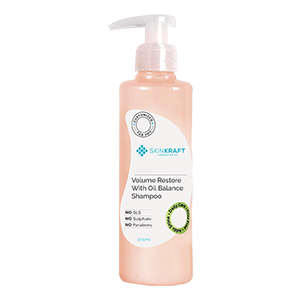You adore your hair. Like everyone else, you want it to look lustrous and voluminous forever, right? Collagen can play a huge role!
The building block of many parts of the human body, including skin and hair, collagen is the most abundant protein found in us. It comprises 45 percent of the skin’s dry weight and makes 30 percent of the body's total mass. [1]
But as you age, the collagen production rate of your body reduces, leading to aging signs like wrinkles, sagging skin and hair loss. Let's find out how collagen works for your hair and how you can prevent hair loss due to low collagen.
Highlights:
What Does Collagen Do For Your Hair?
Collagen can help repair your damaged hair and replenish hair loss by promoting hair growth. It keeps your curls healthy and shiny.
When your body starts losing collagen due to age, collagen supplement can be your savior.
Here are some of the main benefits of collagen for hair:
1. Collagen adds volume
A research study done by a group of scientists in Japan found that the level of a particular type of collagen near the hair follicles decreases as we age, which results in hair loss. [2]
Additionally, an amino acid called proline helps to protect the hair by keeping it safe from the damaging effects of the free radicals. Thus collagen's antioxidant properties help to increase the volume of hair by strengthening your hair follicles.
2. Collagen makes your hair shiny
As you grow old, your hair can become brittle and dull. This happens because beneath the hair follicles are sebaceous glands, which secrete oil to keep the hair moist.
Collagen plays an important role in the overall functioning of this entire process, resulting in lustrous and glossy hair.
3. Collagen keeps your hair healthy
Collagen holds your dermal layer and hair follicles together, which in turn keeps your hair strong and healthy.
When the collagen production reduces due to aging, your hair follicle becomes brittle, while the dermal layers get dried up resulting in hair fall.
4. Collagen reduces hair greying
Hair gets its natural color from melanin, a pigment, that is produced by the melanin-producing cells. As we age, the melanin producing cells begin to die, thus turning the hair grey.
Although greying of hair is largely controlled by genes, free radicals that accumulate from stress, poor diet, and chemical buildups from hair color and shampoos can further cause hair greying. Collagen is known to have antioxidant properties that negates the hair greying from these free radicals.
Which Collagen Is Best For Hair Growth & How To Use?
You can include collagen in your diet in many ways. Collagen supplements are made by extracting collagen from connective tissues of other animals including fish, cows, and chickens.
Bone broth is one of the richest sources of dietary collagen that you can add to your diet. You may sip it as a drink or soup.
If you are not eating sea fish or bone broth, you can pick bovine collagen that is derived from pasture-fed cows. These collagen supplements come as a powder.
Add a lot of Vitamin C rich food in your diet to boost the collagen production in your body. For example, bell peppers, oranges, strawberries, sprouts, etc are loaded with vitamins that can boost the body’s natural ability to produce collagen. [3]
You can also add collagen supplements to your diet. Supplements come in the form of pills and powder that you can mix in your juices or smoothies. Collagen supplements are usually in their broken-down form so that your body can absorb it quickly.
Note:
Collagen supplement is usually safe to use but some people might have a heartburn or stomach discomfort [4]. Read the label to ensure your collagen supplement is devoid of MSG, USP/NF compliant, and the ingredients match with the claims it makes.
How Much Collagen Should You Intake Daily For Hair Growth?

If you want to incorporate collagen supplements for hair growth, you need to first determine how much collagen is needed by your body.
Remember, not everybody type is the same and hence the requirement of collagen also varies. For example, if you are exercising regularly, you tend to break down collagen faster. Similarly, if you are under stress, you may lose collagen faster.
Depending on your body's requirement, you can adjust collagen requirements. While determining the collagen amount you want to intake, consider your dietary sources as well. For example, salmon skin is a rich source of building collagen. If you are a regular salmon eater, adjust your collagen supplement intake accordingly.
If you are looking for collagen supplements, opt for the unflavored and pure form of collagen. Your doctor can advise you on the collagen supplement dosage after evaluating how much collagen your body is breaking down and how much protein you are intaking from your dietary sources.
Note:
The golden rule is to incorporate as many grams of protein in your diet as you weigh in pounds.
Is too Much Collagen Bad For Your Hair?
Like any other supplement, too much collagen supplement is also not good for your body. It may cause stomach upset, rashes, and stomach fullness.
An autoimmune disease called scleroderma occurs when the body produces excessive collagen. While the localized scleroderma can affect the skin, the systemic scleroderma can affect both the skin and the internal organs. [5]
Note:
Alway consume collagen supplements only under strict medical advice.
Wrapping Up
Collagen is the most important protein that holds your hair together, gives it volume, and retains its natural moisture. As you age, you may start losing collagen, which leads to hair fall. Collagen supplements are a great way to replenish the lost collagen and give your hair health a boost. However, all supplements should be taken only after consulting with a doctor.
Recommended Products
Was this Article helpful?
- Least helpful
- Most helpful











